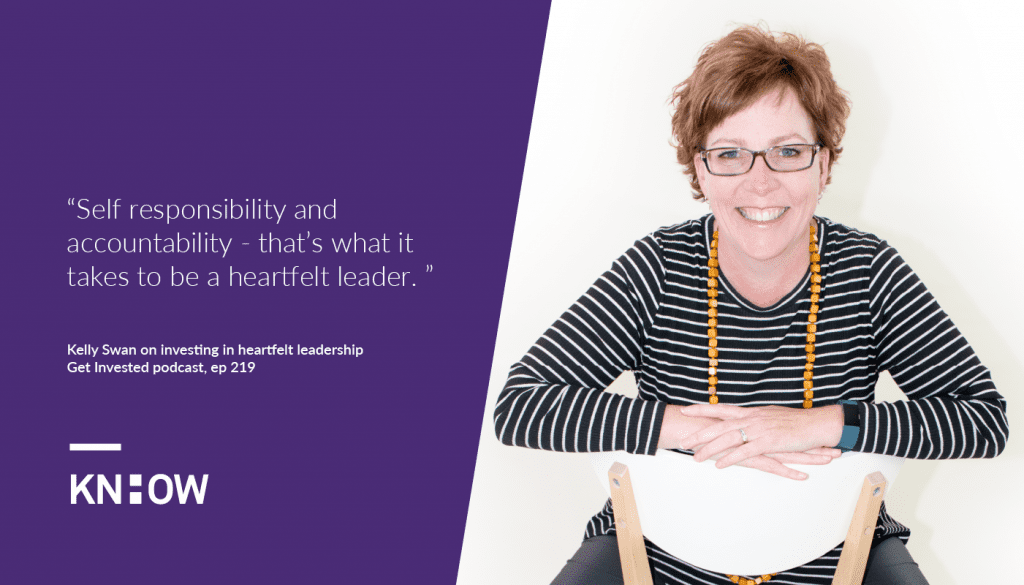Business leader Kerry Swan says investing in the nine principles of heartfelt leadership can see people and teams thrive.
In all aspects of life, including investing, you need to apply personal leadership, for yourself and others, in order to make the right decisions.
But what type of leadership is best? For entrepreneur, author and project manager Kerry Swan, heartfelt leadership makes a world of a difference.
Rather than applying a top down command and control leadership model, Kerry instead invests in heartfelt leadership – a bottom up, balanced approach that fosters a learning culture.
“I grew up in the 80s and the sort of leadership I was exposed to in those days was very much the command and control model, the I”m the boss here’s what I want you to do’ type model,” she told KnowHow founder Bushy Martin on the Get Invested podcast.
“Where as I see heartfelt leadership as a new model of what I would call influence, where you’re taking a bunch of your skill sets, including your masculine skill sets – your logic, your planning, your tasks – which you then balance with your feminine skill sets – so your creativity, your intuition, your relationships, your reflective skill sets. And then you’re putting them together in a way that’s more courageous and that you’re then influencing the people around you because you’re approaching it in a more balanced fashion than perhaps what some of us have been used to.
“So it’s more a bottom up than a top down approach where you’re supporting others, creating a circle of safety, allowing them to fail but also learn as they go. Then you have a shared vision so that everyone’s allowed to do that at their own pace, but feel that they’ve got their backs covered.”
Kerry went on to describe her nine principles of heartfelt leadership, with the first three being project management related principles.
“So the first principle is really getting clear about what you want and work your way through to do that. The second principle is about working on your plan, having a good plan, but also allowing chaos and creativity with that plan. And the third one is taking responsibility for your own stuff,” she said.
The next two revolve around interaction with your team and building better relationships. This particularly comes from being able to have honest, robust and different conversations in person.
“I talk a lot about the importance of having difficult conversations in terms of influencing the people around you. One of my favourite principles is choosing your words and choosing better words when you interact with a team, because as a leader the words that we use matter,” Kerry explained.
“In our current culture, it’s really easy for any one of us to send an email, send a text message, send a messenger group conversation about something that we’re not happy about because all those tools are available to us. But it’s really a mark of the shame and the measure of the human when they’re prepared to have that conversation and sit with the discomfort. These conversations are so important.”
Bushy added: “These conversations can really flush out the bad stuff and and it is quite confronting at times because we’re the worst person at knowing ourselves most of the time but other people say it loud and clear, and that’s worked wonders for the sort of honesty that happens in the business. It’s such a core skill and such a big need at the moment.”
Principle number six is all about self responsibility and accountability.
“Next is keeping it real for you and your team, which is about self responsibility and accountability. How do you hold the people around you accountable for their jobs,” Kerry said.
“As a leader, we’re in positions of influence and we need to own that influence both to the people around us, but also to ourselves. So it’s really about having truthful conversations with ourselves, but also the people around us. So having the courage to go inwards and think about what’s the best outcome in this situation for me and the people around me?”
Finally, Kerry elaborated on the third set of principles.
“The seventh principle is around feeding your team their favourite food and one of the traps that we fall into as leaders is we tell them what we want them to do rather than doing much listening,” she said.
“Then celebrating success because life is short is a very powerful principle … we just don’t know what’s around the corner. So [my book] talks a lot about celebrating the little wins and the big wins with the team and and how to go about that.
“And then the final principle is knowing that our life is an iterative process. So we’re not going to get it right every day. It’s what we learn from that and then what do we need to do to reiterate or refocus whatever it is that we’re working on, whether it’s work, life, home or family. So we need to keep seeing it as a learning journey rather than a perfect journey.”
Listen to the full interview here.
Want to Know How you can build wealth with the help of leading, qualified experts? Talk to the team at KnowHow, now.




